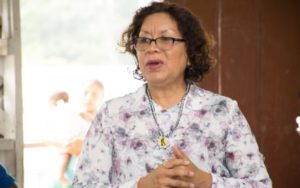Mabaruma, Region One will see the introduction of a seafood processing plant in the near future, to assist residents with the preservation of their day’s catch, which is usually wasted owing to the lack of a processing and storage facility.
This was announced by Junior Indigenous Peoples’ Affairs Minister Valerie Garrido-Lowe, who told Guyana Times International last week, of the intentions of the Ministry to provide the residents with the new facility. She noted that the shelf life of the seafood that is caught will be extended enabling fisherfolk to earn more.
“The facility will be for crab and fish. That is for a longer shelf life so that the people can earn a living there. Normally, the Waraus would just come and bring their crabs. If they bring a crate, two or three might get sell and they have to carry it back home,” the Minister noted.

“If they bring fresh fish, all of that wouldn’t sell but if we have smoked fish or salted fish, it can be preserved. Now if we have the facility, it can supply the whole region,” she added.
Meanwhile, Garrido-Lowe also commented on the status of the coffee and cassava flour projects in the Moruca sub-district which are currently ongoing. For the cassava flour project, the site for the building as well as the design has been finalised.
“With the coffee, the seeds are being brought from Brazil. [National Agricultural Research and Extension Institute] NAREI will germinate it and the farmers already cleared their lands to plant. They would have to do intercropping because with coffee farming, you can reap until next year and a half or two. So they would do intercropping with peas, melon and cassava,” she added.
The area is strategically positioned to engage in significant economic gains and the coffee and cassava flour projects will be among other sustainable initiatives to change the trajectory of the lives of residents. Some 15 farmers from Santa Rosa Village is expected to be involved in the coffee project, while 35 will be involved in the cassava flour project in Kwebanna.



